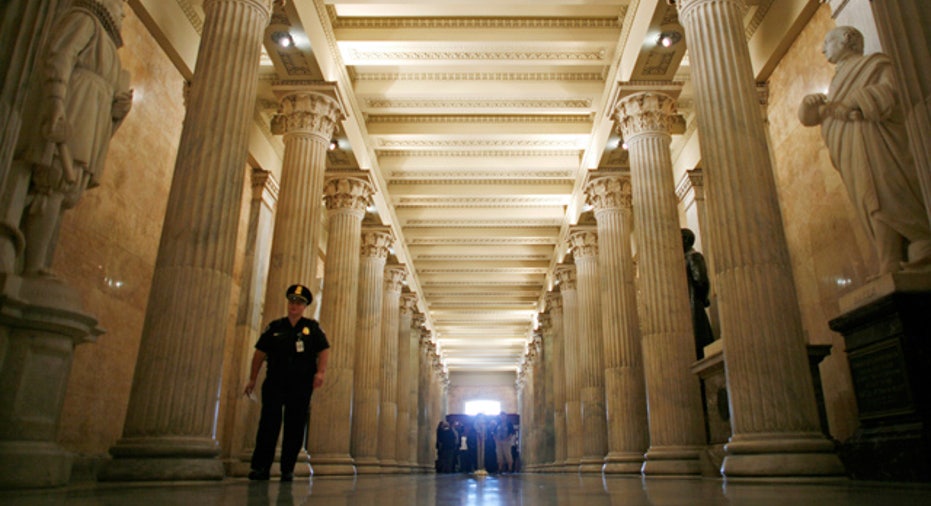Tax Deal Moves Forward Despite Doubts

A plan by President Barack Obama to broadly extend tax cuts moved forward on Wednesday despite opposition from his own Democrats and fear in bond markets of long-term damage to the economy.
Senate Democratic leader Harry Reid said the chamber could begin to debate the proposal to extend all Bush-era income tax cuts within a day or two, in a sign Democrats may be conceding on the deal.
"It's further along than most people think," Reid said. "I don't think there is a great more to be done on that."
Obama struck an agreement on taxes this week with Republicans, who have grown in clout since winning control of the House of Representatives in last month's congressional elections.
The president has brushed off criticism from many Democrats that he has been too eager to compromise with the opposition. He urged Congress to debate the tax deal and said lawmakers need to "get this done."
U.S. Treasury prices plunged again on Wednesday, with benchmark yields hovering at their highest in six months, as debt markets worry the tax plan will stoke inflation and deepen the budget deficit.
"This tax agreement is a disaster for the U.S. fiscal situation," said Howard Simons, strategist at Bianco Research in Chicago.
The dollar, however, advanced on perceptions the tax cuts could increase U.S. economic growth.
Obama's plan would extend all individual tax cuts expiring at year end, in addition to renewing jobless benefits, a payroll tax cut and other measures.
Several economists said the plan could boost growth from a half to a whole percentage point next year, cut unemployment and lessen demand for the Federal Reserve to boost its bond-purchasing stimulus program.
White House economic adviser Larry Summers said failure to pass the plan would "materially increase" the chance of a double-dip recession.
NO BETRAYAL, SAYS OBAMA
Taxes would go up for almost all working Americans if political gridlock sets in and no extension of the cuts is approved.
Obama needs to slash unemployment and win over voters to help his bid for re-election in 2012. He said Democrats had not been "betrayed" by his tax deal with the Republicans because he was acting to spur the economy.
"I expect everybody to examine it carefully," Obama said. "When they do, I think they're going to feel confident that this is the right course."
He also said that after two years when the economy recovers, the country can overhaul the tax code and the budget deficit.
A Senate Republican aide estimated the tax cuts would cost $700 billion for two years, although other estimates have put the total cost as high as $1 trillion, at a time when voters are increasingly anxious about deficits that have approached 10% of U.S. economic output in recent years.
Although not a sure thing, many analysts believe the bill will pass with a coalition of Republicans and more conservative Democrats supporting it.
"A logical conclusion today is the Senate Democrats get together and look at the overall bill and realize this is the presentation on the table," said Marc Gerson, an attorney and former staffer on the House tax-writing committee.
In addition to tax cuts, the deal calls for a 13-month extension of unemployment benefits, which could appease Democrats. But Obama also conceded to Republican demands on the estate tax by proposing a 35% tax with a $5 million individual exemption level. Obama had originally proposed a steeper tax kicking in at a lower income level.
Democrats are seeking changes to the package, including changes to the estate tax proposal, which they view as a giveaway to the ultra-rich. They also want to renew the Build America Bond program that funds infrastructure projects, and that was being discussed on both sides of the Capitol.
Subsidies for ethanol and other energy tax breaks may also be brought into the bill, lawmakers said.
Vice President Joseph Biden pitched the deal to Democratic senators on Tuesday and pressed the same argument to House Democrats on Wednesday in a 2 1/2-hour session.
"The vice president was on defense," said Representative Sam Farr, who is not convinced to vote for the package. "There is a little catharsis going on."
Biden distributed handouts with charts showing what the Democrats won versus what the Republicans got in the deal.
House Majority Leader Steny Hoyer called the meeting "lively."
"Clearly the administration's rationale, that we need to ensure that the economy continues to grow, I think is an important objective," Hoyer said. "And we'll see what the Senate passes.



















